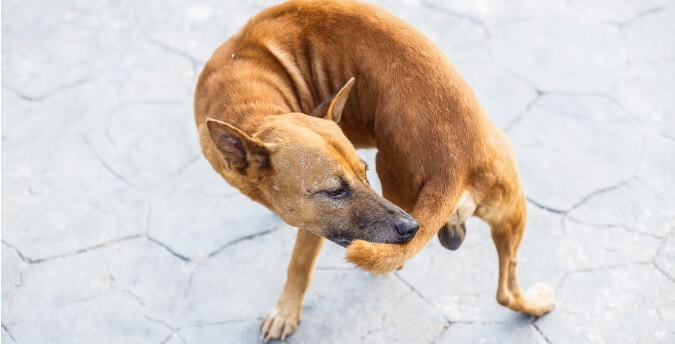Why Does My Dog Bite Its Tail?

Tail biting or chewing is a fairly common occurrence among canines. You may have noticed this behavior in your pet many times, and have dismissed it as a temporary itch or irritation.
Although tail biting isn’t usually a cause for concern, it may indicate a more serious issue. If tail biting occurs frequently or causes irritation or bleeding, it will be necessary to determine the cause of it so that you can administer the proper remedy.
CAUSES OF TAIL BITING
The first step is to determine why your dog is biting his tail. Some causes are relatively easy to deal with, and may even be insignificant. Others will require medical attention to prevent more serious health problems.
Allergies
Allergies are among the most common causes of tail biting. The irritant may be food, household chemicals, or something else in the immediate environment. Flea or tick bites may also trigger allergic reactions. If you cannot determine the allergen, it may be necessary to take your dog to a veterinarian for thorough testing.
Stress and Anxiety
Stress and anxiety can trigger tail biting episodes. For some dogs, a change in the daily routine or their environment can cause anxiety, which may lead to tail biting. These cases tend to occur more often among dogs that get insufficient mental or physical stimulation. There are some dog crates designed specifically to aid with anxious pups.
Fleas and Ticks
If the tail biting occurs mostly during the warmer months, fleas or ticks are the likely culprits. Dogs will typically lick, chew, or scratch at the site of the infestation, which is often near the tip of the tail.
Hot Spots
Dogs may bite their tails to relieve a hot spot, which commonly occurs in pets that live in hot and humid environments. Ironically, hot spots themselves are caused by repeated scratching, chewing, and biting. As the irritation worsens, your dog may continue to pick at the area to relieve the discomfort, eventually resulting in an open wound. Your dog then gets into a cycle of relieving himself from the very irritation that his actions are causing in the first place.
Anal Gland Issues
Impacted anal glands may also cause your dog to bite at his tail toward the base, or drag his hindquarters along the ground. The condition also causes constipation, and there may be a foul smell from your pet’s backside. In more severe cases, pus or blood may be noticeable in the feces.
Injuries
A bruise, sprain, or a fracture could also trigger repeated tail biting. Injuries that occur to the dog’s rear aren’t always noticeable, and owners may only realize the problem when their dog continues to bite at the area.
Hormonal Issues
If your dog seems to be frequently biting his tail for no apparent reason, he may be experiencing hormonal imbalance. These cases may result from excessive cortisol production or insufficient thyroid production. Both these conditions could cause skin infections and hairless patches, which dogs will then chew on to relieve the discomfort.
Boredom
Some cases of tail biting are caused by boredom. Just like humans, dogs will develop certain habits when bored, such as chewing at their tails. Most such cases are nothing to be concerned about. However, you should probably increase the mental and physical stimulation you are giving your dog to prevent the biting from causing serious health issues.
WHAT TO DO WHEN YOUR DOG BITES THEIR TAIL
Many of the underlying causes of tail biting can be solved by changing your dog’s diet or daily habits. Maintaining proper hygiene could also help reduce these instances, and it never hurts to keep their living areas clean.
But not all cases of tail biting are so easily handled. If the behavior persists or causes more serious problems, it is advisable to take your pet to a veterinarian as soon as possible.
